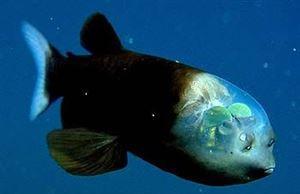1. Posterior fish:
The first two things that look like eyes are not actually its eyes. Inside its transparent head, the two green objects were its eyes. An important function of these eyes is to allow the posterior fish to catch all the tiny rays of light in the deep sea.

2. Haizhu:
A jellyfish-like animal that feeds on phytoplankton (seaweed, etc.) in the water and completes its movement in the water by inhaling and spewing out seawater. Their bodies are barrel-shaped and almost completely transparent, and the internal structure can be seen through the sac, which plays an important role in the carbon cycle.
3. Drop fish:
Also known as the sad fish or the soft hidden thorn dubu fish, the bobo fish, because of the weeping face, known as "the world's most sad expression" fish. [This fish is too human-like]
4. Leaf-shaped sea dragon:
These slow-moving fish, in the same family as seahorses, use their leaf-like appendages to camouflage and evade predators. Because of its beautiful green leaves, swimming and swaying, it is called "the most elegant swimmer in the world".
5. Rainbow eel:
Rainbow eels look very pretty, but don't get too close to them as they can be very aggressive when infested. Most peculiarly, rainbow eels change color and gender over the course of a lifetime. They can usually grow up to 1.3 meters long. They are born male, but as they mature, they also develop a female part.
6. Sunfish:
Also known as sunfish, mambo fish, head fish, it is also the largest bony fish, with a maximum weight of 2200 kg. The juveniles are covered with nodular spinous processes that fade with age and become ovoid in their bodies.